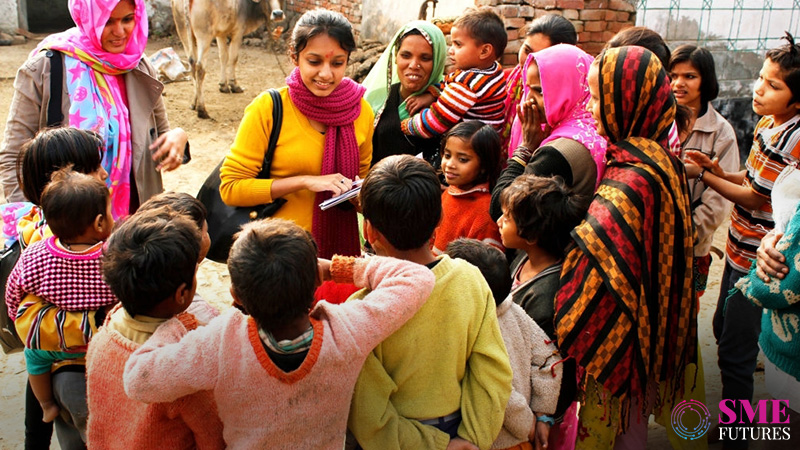During the pandemic, Ameer Ali, a social activist from Palakkad, Kerala, was distributing food, arranging medicines, and organising rations for the needy, going above and beyond community and politics.
Another social entrepreneur and activist from Karnataka, Nitin Vas, came up with a unique initiative for environmental conservation by introducing eco-friendly masks made of cotton rags that will naturally grow to become plants when discarded.
Mann Deshi, a Maharashtra-based social purpose organisation that normally works to assist women in gaining access to finance, skills, and markets, acted as a frontliner during the pandemic. Embedded in rural areas, the firm is providing healthcare, food and small loans to women whose businesses were affected by the pandemic. Similarly, Delhi based Goonj provided all sorts of humanitarian aid across the country during the crisis.
These are just a few examples of how social innovators and social entrepreneurs have worked for years to address market failures and demonstrate more sustainable models for creating inclusive economies. And in times of crisis such as the COVID-19 pandemic, many of them have stepped up to address the social issues engendered by the pandemic. In fact, the work they are doing is more important than ever because they reach those who go unnoticed by the market and governments.
“The swiftness and efficiency with which social entrepreneurs have responded to the COVID-19 pandemic in India and its impacts have made one thing clear: their on-the-ground presence and ability to act as first responders in support of vulnerable communities are incredibly important to global COVID-19 response efforts. We must urgently support this under-recognized cohort of leaders who are operating at the forefront of the pandemic response. They have critical lessons to impart on building a more shockproof, inclusive and sustainable economy in its aftermath,” states Pavitra Raja, Community Manager at Schwab Foundation for Social Entrepreneurship in her WEF blog.
According to a pre-COVID report on social enterprises, India may have as many as 3.3 million social enterprises. However, social tech start-ups are limited. As per a NASSCOM 2019 report, there were 400 social tech start-ups in India.
However, social entrepreneurship is becoming more popular in India gradually, and since the pandemic took hold, their numbers might have grown.
“India’s social entrepreneurship ecosystem is one of the most diverse and offers countless opportunities. There are multiple possibilities to connect with local partners and adopt innovative solutions to India’s numerous social challenges in the fields of education, healthcare, agriculture, renewable energy, manufacturing, and skill development,” opines S Gopalakrishnan, past president, CII and co-founder at Infosys in a report on the social entrepreneurship landscape in India.
Experts argue that social enterprises are of vital importance, as they take on the issues of those living in economic depravity, highlight other important issues and create viable and sustainable solutions.
“With India committed to achieving the 17 SDGs set up by the United Nations, social entrepreneurship provides the much-needed ammunition to rapidly realize and reach these targets. Social entrepreneurship has garnered notable interest among several investment firms and venture capital investors, as it has a huge market size and great business potential. Many philanthropists and large corporations, through their corporate social responsibility (CSR) initiatives, are also aggressively backing social entrepreneurs, as they are passionate about bringing change and creating a positive impact,” Mohit Bhasin, Partner and Head—Economic Development Advisory at KPMG India, mentions in the CII report.
The investments in the sector so far have been persistent. According to the India Impact Investors Council (IIIC) report, the education, healthcare, and agricultural sectors in India received $2.6 billion worth of impact investments in 2020. Whereas globally the impact investment market size is $715 billion as per a 2020 survey by the Global Impact Investing Network (GIIN).
According to a report by JP Morgan, impact investments are an emerging asset class with the potential to offer, over the coming 10 years, a profit of $183–$667 billion and an invested capital of $400 billion–$1 trillion.
But given the impact of COVID on various businesses, the landscape of social entrepreneurship will be profoundly altered, despite the fact that it is already facing certain market challenges.
However, there are investment opportunities in other areas that also need attention along with many other issues that need to be tackled.
A combined CII and KPMG survey on the scenario of social entrepreneurship in India, highlights these key issues and makes some policy suggestions for the improvement of this sector. According to the respondents, these are the top challenges that a social enterprise has to face.

Lack of skilled people
A long-time friend of mine switched her job from social work to corporate admin work. The reason being that even though her prior job provided her with a lot of mental satisfaction, it was not the same case financially.
Working in the social sector often means lower profit margins and longer revenue cycles. This is one of the main reasons that these enterprises are unable to attract the talent that is needed to develop products and services. A respondent, citing their own example describe their challenge of finding and retaining a consistent team of developers for their unique software product due to the longer sales cycles and lower revenue potential in the sector. This leads to uncertainty and inconsistency in the quality of their output.
According to an expert, attracting talent also depends on the payscale that an organisation is offering. And the salaries of social enterprises vary greatly and depend upon many factors. For starters, for many social enterprises profits are not the main aim. This obviously affects salary levels. Most of them are start-ups and in their emerging stages, hence the disparity in salaries. This directly impacts the process of attracting and retaining skilled manpower.
The CII report suggests some measures to intervene in capacity building, “If the government or philanthropic organisations can provide support for overhead costs, a sort of ecosystem that provides basic infrastructure, a cohesive environment for start-ups to thrive, then it will be easier for social entrepreneurs to spend more on strategic needs such as hiring human resources, acquiring clients, etc.”
Besides that, the report also mentions that the promotion of social enterprise learning and creating incubation capabilities on the academic front can also support the growth of this sector.
Raising debt or equity
Finding investors is probably one of the main challenges for any business in India, especially in the initial phase. And social enterprises are no exception. They often lack connectivity to the investors due to the lack of a network or platform to initiate and raise funds. Meanwhile, experts are also of the opinion that raising capital through loans may sometimes backfire.
For a variety of reasons, social enterprises, particularly start-ups, have not been able to attract as many impact investments as tech start-ups have. One of the reasons for this is the lack of a legal definition for social enterprises in India. There is a need to give legal status to social enterprises in a way that reflects the realities of this space and the context in which they operate.
Renita D’Souza, a fellow at ORF Mumbai, in her research paper explains, “As social enterprises are not recognised as separate legal entities, there is no standardised legal structure that oversees their functioning. As such, social enterprises incur significant costs in terms of registration, compliance, seeking of approvals etc. A large-scale regulatory platform that acts as a one-stop shop for compliance, registration, incorporation, and all forms of approval for social enterprises needs to be set up.”
To counter the investment challenge, the CII report suggests that social stock exchanges would be the ideal solution for raising equity efficiently without too many hassles as it would give them greater visibility in the ecosystem, facilitating an easier connect with potential investors.
Further, there is an opportunity for bodies like CII to facilitate the creation of investment clusters.
Social enterprises find it hard to obtain grant funding
55.56 per cent of social enterprises surveyed said that there are not enough opportunities to gain access to grant fundings in the particular sector that they are working in.

Grant fundings are usually given by an entity – a public body, charitable foundation, or a specialised grant-making institution – to an individual or social enterprise for a purpose linked to public benefit. Unlike loans, grants do not have to be paid back.
The issue arises with the implementation of the Foreign Contribution Regulation Act (FCRA) 2020 amendment, which the already over-regulated sector has opposed.
The bill proposed four changes: it prohibited any FCRA organisation from making subgrants or distributing money from foreign contributions to other FCRA organisations. Then, it restricts administrative expenses to 20 per cent. Whereas these NGOs mainly depend on admin work for social innovations and social work. The third change it proposed was that every FCRA organisation should have their FCRA bank account in a single Delhi branch of SBI, which seems like a diktat in times of online banking. Another change is in the form of the granting of more power to investigative officers. This arbitrary power given to officials can lead to corruption.
Amitabh Behar, CEO of Oxfam India, in his blog wrote that these amendments reflect a deeply flawed understanding of democracy – in which it has been reduced to an electoral democracy or a quest for state power, and any other form of democratic action is seen with suspicion and considered illegitimate.
Difficulties in securing social venture funds (SVF) grants is another issue that social enterprises have to deal with.
The main issue with such funds is that they are solely restricted to investors who are high net worth individuals (HNIs) or Ultra HNIs, as the minimum amount of investment that can be made starts from Rs 1 crore. That’s why most investors back off.
Experts in the social sector have emphasized the need to lower the minimum amount of investment from Rs 1 crore to Rs 1 lakh. This would allow more people from varying financial backgrounds to invest in such funds. Lowering the costs of financing capital would then increase the flow of philanthropic money in the sector.
Financial institutions lack knowledge
According to the CII survey, banking and financing firms lack awareness about social enterprises or the social entrepreneurship ecosystem altogether. A whopping 66.67 per cent said yes, which is a surprising finding.

A stakeholder anonymously said, “There is certainly a lack of understanding about the journey or lifecycle of an NGO— right from the Idea of it, to its inception and finally to its growth into an institution. Many times, a lot of social enterprises are asked difficult questions like ‘what is your scale strategy’ at the idea and start-up phases, where they have not yet proven their model. I think that there is a lack of understanding about their need to prove themselves and their entire journey.”
Issues with taxation
To obtain various clearances, a social enterprise has to deal with central, state, and local government departments. Then, taxation becomes a major issue for these businesses because, while all NGOs are tax exempt, tax authorities have yet to come to terms with social enterprises with a profit motive. We can say that there are no special tax breaks because there are no special considerations for social enterprises, particularly those registered as for-profit corporations.
Having said that, section 12A of the Income Tax Act becomes a limiting factor for such start-ups. If their revenue income exceeds their grant income (by 20 per cent), then social enterprises have to pay tax on the income that they have generated.
Experts have suggested that if the percentage of this exceeding income gets raised from 20 per cent to more than 30-40 per cent, it would make it less likely that social enterprises will have to pay taxes on the revenue generated by them.
At the same time, like any other business, social enterprises too are dealing with GST compliance which hampers their operations like it has done for everyone else. First of all, it’s a high tax slab—18 per cent. Not only does this reduce the funds available for putting their plans into development, but it also creates other challenges. Firstly, GST compliance creates cash flow issues for social entrepreneurs as they don’t get paid upfront most of the time. Secondly, it saps too much of their energy which could otherwise have been spent on running their business operations.
To mitigate the problem, industry experts suggest lowering the tax slab for social enterprises. “Having a reduced slab rate would leave social enterprises with more funds for operations. A GST rate of 18 per cent is overwhelming, especially for those enterprises that are currently in their initial stages. Experts anticipate a GST slab rate of 5 per cent solely for social enterprises. Also, consider lowering the GST for buyers who procure from registered social enterprises,” the report quotes them as saying.
What more can the social sector expect?
Social enterprises across the country are expecting more from the government.
One of their expectations is the formation of a nodal agency for social enterprises.
CII states that the government along with Niti Aayog and other organisations, should set up a national body for the development of social enterprise ventures and their ecosystem. This national body can liaison with Indian and global agencies to implement the best global practices and recommendations.
Besides that, people from this sector want development around technology to be encouraged and a research IP for public good with various collaborations, to be launched. Stakeholders also suggest that CSR funding should be allowed for the creation of open-source digital platforms for social good by social enterprises, for example a tech platform for city open data projects.
Another key demand revolves around the creation of a seed fund for high priority unaddressed sectors such as tribal healthcare and the development of a market for artisans. Which could further be allowed to be leveraged by start-ups in the early stages. This in turn will increase innovation in the field. A good example of this is the DST Cowach program & ACT grant for COVID related social innovations.

Social enterprises have a bright future
Social enterprise has long been recognised for its ability to challenge the status quo and navigate interactions with markets, institutions and governments to make the world a better place.
Now more than ever, with a pandemic that has revealed the breaches and deficits in healthcare, finance, housing, etc., and has exacerbated the need for coordinated responses, social enterprises are imperative. At the same time, India’s rank in the global human development index (129 among 189) underlines the further need for it to invest more in the social sector.
There are many opportunities to make it big in this sector by making a concerted effort and bringing innovative solutions to the table.
But for social enterprises to be agile and survive against all odds, the industry, its stakeholders and the government must collectively work together to resolve the multiple challenges plaguing this sector; keeping in mind that it is these very enterprises that are the fountainhead for bringing about real and positive social changes in society.











